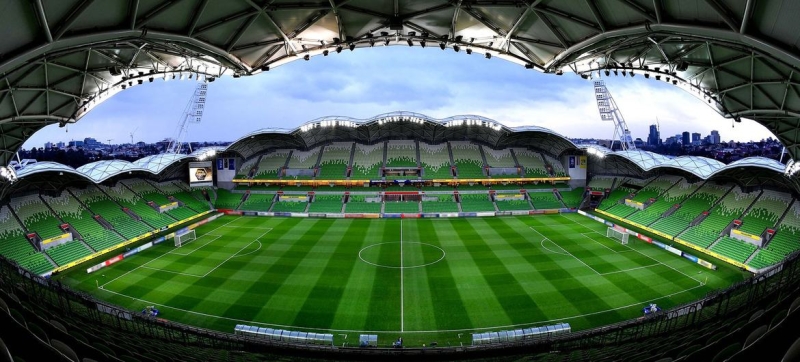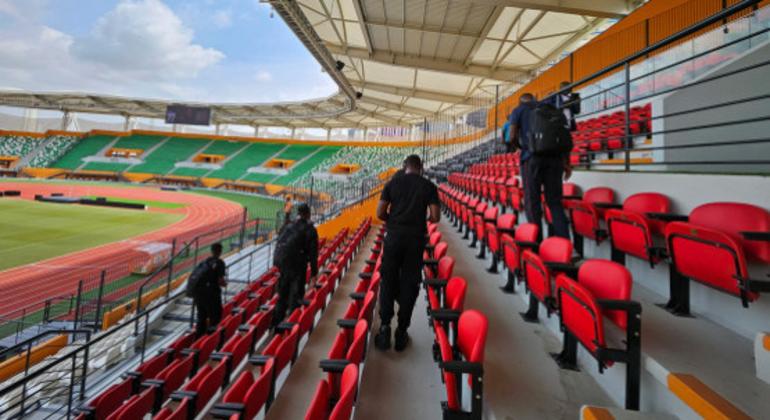
The IAEA supported Côte d’Ivoire’s nuclear security efforts at the Africa Cup of Nations by providing local experts with hands-on training on the necessary security measures. How the IAEA ensures nuclear safety behind the scenes at major public events Peace and security
In 2004, when the Greek flag was raised over the stadium to mark the return of the Olympic Games to their ancestral homeland after more than a century, most of the spectators and athletes in attendance had no idea of the extensive behind-the-scenes efforts that had been made to protect them from potential nuclear security threats. It was the first time that the IAEA had trained and provided equipment for such an event.
A major public event (MPE) is a planned national or international event that is classified as a major event by the host country and that requires the implementation of comprehensive security measures, including those related to nuclear security. Today, as representatives of the global community regularly participate in such events as sporting events, high-level political or religious forums and international conferences, the key to ensuring nuclear security is planning, as well as training.
Nuclear security during COM includes measures to prevent, detect and respond to criminal or intentional unauthorized acts that involve nuclear or other radioactive material or are directed against nuclear and associated facilities. The IAEA is leading efforts to integrate nuclear security protocols into traditional COM security arrangements. Such efforts are critical to maintaining world peace and protecting the lives of millions of people.
“The IAEA’s assistance and support in this area includes the provision of loan equipment, training workshops, tabletop and field exercises, and on-site technical assistance from international experts,” says Itimad Sufi, Head of the Nuclear Materials Security Section, outside the regulatory control of the IAEA Division of Nuclear Security. “Our dedicated and, one might say, behind-the-scenes work to ensure nuclear security ensures that no threats will overshadow the event.”
The IAEA also assists CCM host countries in a special way – through information sharing. Prior to the event, the IAEA can prepare a targeted analytical report based on the Incident and Trafficking Database that examines nuclear security threats, trends and patterns, with a focus on the host country and region.

Increasing role of the IAEA
Since the IAEA first assisted in the preparation of the 2004 Olympic Games in Athens, its role in the conduct of the COM has only grown. . Over the past 20 years, the IAEA has assisted in the preparation of a number of major international events, providing assistance in the implementation of nuclear security measures.
The IAEA has provided expertise and resources to 75 WHO in 46 countries – from World Youth Days to the Women’s and Men’s Football World Cups. The IAEA recently supported preparations for the African Cup of Nations in Côte d’Ivoire and provided local experts with hands-on training on necessary safety measures, including advance analysis of the threats and possible consequences of the deliberate misuse of nuclear or other radioactive material.
“An event of this magnitude requires the establishment of an overall security plan that includes nuclear security measures. Thanks to collaboration and assistance from the IAEA, this event was able to ensure compliance with nuclear security requirements,” says Oka N’guessan Guy Leopold, nuclear physicist and Deputy Director of the Nuclear Security and Security Division of the Radiation Protection, Nuclear and Security Directorate of Cote. d’Ivoire.
Read also:
What is radon and how are we exposed to it?
Other events that benefited from nuclear security support included the 27th and 28th sessions of the Conference of the Parties to the United Nations Framework Convention on Climate Change, held in 2022 and 2023, respectively, in Egypt and the United Arab Emirates (UAE). KS-27 and KS-28).
“It is imperative that COMs, which attract delegates, specialists and members of the general public, are conducted in accordance with the strictest safety standards and security, including nuclear security. The UAE worked closely with the IAEA to ensure compliance with international nuclear security standards during COP 28,” says Fahed Mohamed Al Blushi, Director of the Nuclear Security Department at the UAE Federal Nuclear Regulatory Authority.
Innovation in technology and learning
The IAEA has kept abreast of developing technologies over the past 20 years, which have resulted in the development of applications and software for nuclear physics-related operations. security and decision making. In 2023, the IAEA introduced the Mobile-Enabled Integrated Nuclear Security Network (M-INSN), which provides real-time radiation data in high-traffic areas such as airports, land borders and seaports where there should be Nuclear security measures are provided. M-INSN can significantly improve the implementation of nuclear security measures during COM. M-INSN was first used during the COM in August 2022 at the FIFA U-20 Women’s World Cup in Costa Rica. The tool was also used to support the implementation of nuclear security measures at COP-27.
At the same time, the IAEA continues to enhance its training and support programs to ensure a high level of preparedness for countries that conduct major events to address nuclear security issues. For nuclear security officials and experts, the newly opened IAEA Nuclear Security Training and Demonstration Centre
is hosting workshops and simulation exercises on a range of scenarios from the detection of unauthorized radioactive material
before implementing response measures.
In the last six years alone, the IAEA has leased more than 3,500 pieces of radiation detection equipment to countries around the world. Participation in training programs, tabletop exercises and field exercises conducted by the IAEA jointly with international nuclear security experts helps countries ensure they are prepared to address today’s complex nuclear security challenges.
Effectively addressing nuclear security issues during global events is of critical importance to international relations and public safety, and is an important practical example of the IAEA’s unwavering commitment to global peace and security.
